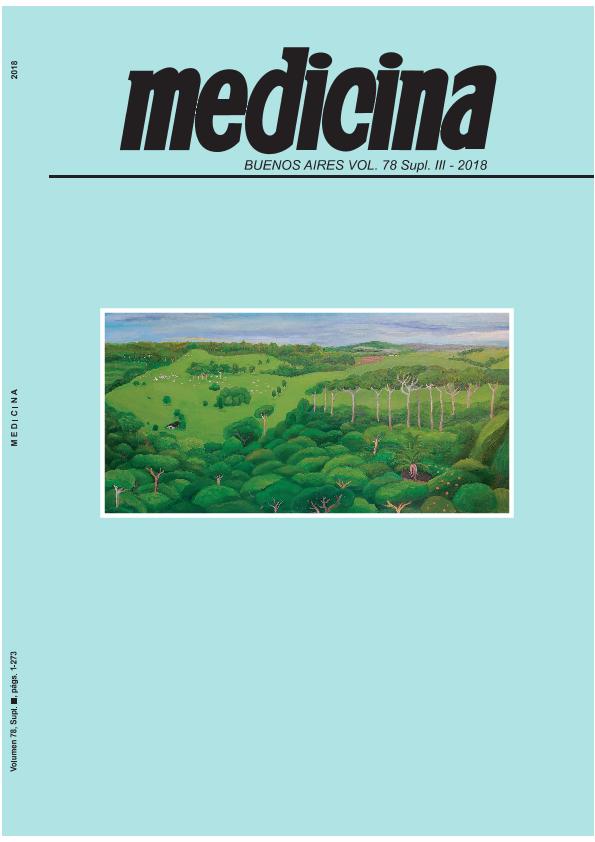Mostrar el registro sencillo del ítem
dc.contributor.author
Gastaldi, Bruno

dc.contributor.author
Assef, Yanina Andrea

dc.contributor.author
González, Silvia Beatriz

dc.contributor.author
Marino, Gabriela Inés

dc.contributor.other
Perez Leiros, Claudia

dc.contributor.other
Baldi, Pablo Cesar

dc.contributor.other
Crottogini, Alberto Jose

dc.date.available
2022-04-08T12:09:38Z
dc.date.issued
2018
dc.identifier.citation
Adesmia boronioides and Solidago chilensis, two novels herbal infusions with toxic effects against colon cancer derived cells; LXII Reunión Anual de la Sociedad Argentina de Investigación Clínica; LXVI Reunión Anual de la Sociedad Argentina de Inmunología; Reunión Anual de la Sociedad Argentina de Fisiología; Mar del Plata; Argentina; 2018; 1-4
dc.identifier.issn
0025-7680
dc.identifier.uri
http://hdl.handle.net/11336/154719
dc.description.abstract
The development and progression of colon cancer is strongly influenced by diet substances that enter in the digestive tract. Herbalinfusions from medicinal plants usually contains phytochemicalsthat can restrain the development and progression of colon cancerin various ways. Flavonoids, an important group of these phytochemicals, report a recognized anti-inflammatory, antioxidant andsignal-regulating properties. Adesmia boronioides and Solidagochilensis are two native medicinal plants that contain flavonoids andhave reported promising antiproliferative activity against T-84 cells.Our aim was to study the toxic effects of herbal infusions obtainedfrom A. boronioides and S. chilensis on Caco-2 and HT-29 cells asmodels of colon cancer.We observed by MTT assay (after 72 h) that the percentage ofviable cells decreased with the increase in the concentration offreeze-dried infusions of both plant species (0 to 50 mg/ml) (p<0.05,n= 3). S. chilensis had a higher antiproliferative effect (EC50 (mg/ml): 0.57±0.06 and 0.18±0.02) in comparison with A. boronioides(EC50 (mg/ml): 1.27±0.08 and 2.87±0.21), for Caco-2 and HT-29cells, respectively. Colchicine was used as positive control. Similarresults were obtained by Trypan blue exclusion technique (p<0.05,n= 3). After staining the cells with AO and Et/Br, apoptosis cells(orange cells) were observed under the fluorescence microscope.The basal apoptotic percentage (24h) was increased in A. boronioides (35.0±4.1 and 46.2±8.2%) and in S. chilensis (47.2±6.7 and35.8±4.0%) with respect to control (3.8±4.9 and 2.7±3.1%) in Caco2 and HT-29, respectively (p<0.05, n=3). The Procaspase-3 expression was also checked.We conclude that the infusion of the both species exert strong antiproliferative activity on cells derived from colon cancer, partly dueto the modulation of basal apoptosis. Its effects show to be muchgreater in comparison with other species studied. These results provide a direction for further researches about the antitumoral potentialof these native plants.
dc.format
application/pdf
dc.language.iso
eng
dc.publisher
Fundación Revista Medicina
dc.rights
info:eu-repo/semantics/openAccess
dc.rights.uri
https://creativecommons.org/licenses/by-nc-sa/2.5/ar/
dc.subject
ADESMIA BORONIOIDES
dc.subject
SOLIDAGO CHILENSIS
dc.subject
HERBAL INFUSIONS
dc.subject
TOXIC EFFECTS
dc.subject
COLON CANCER DERIVED CELLS
dc.subject.classification
Bioquímica y Biología Molecular

dc.subject.classification
Ciencias Biológicas

dc.subject.classification
CIENCIAS NATURALES Y EXACTAS

dc.subject.classification
Farmacología y Farmacia

dc.subject.classification
Medicina Básica

dc.subject.classification
CIENCIAS MÉDICAS Y DE LA SALUD

dc.title
Adesmia boronioides and Solidago chilensis, two novels herbal infusions with toxic effects against colon cancer derived cells
dc.type
info:eu-repo/semantics/publishedVersion
dc.type
info:eu-repo/semantics/conferenceObject
dc.type
info:ar-repo/semantics/documento de conferencia
dc.date.updated
2022-03-16T19:10:05Z
dc.identifier.eissn
1669-9106
dc.journal.volume
78
dc.journal.number
3
dc.journal.pagination
1-4
dc.journal.pais
Argentina

dc.journal.ciudad
Buenos Aires
dc.description.fil
Fil: Gastaldi, Bruno. Universidad Nacional de la Patagonia "San Juan Bosco". Facultad de Ciencias Naturales - Sede Esquel; Argentina. Consejo Nacional de Investigaciones Científicas y Técnicas; Argentina
dc.description.fil
Fil: Assef, Yanina Andrea. Consejo Nacional de Investigaciones Científicas y Técnicas. Centro Científico Tecnológico Conicet - Patagonia Norte. Centro de Investigación Esquel de Montaña y Estepa Patagónica. Universidad Nacional de la Patagonia "San Juan Bosco". Centro de Investigación Esquel de Montaña y Estepa Patagónica; Argentina
dc.description.fil
Fil: González, Silvia Beatriz. Universidad Nacional de la Patagonia "San Juan Bosco". Facultad de Ciencias Naturales - Sede Esquel; Argentina
dc.description.fil
Fil: Marino, Gabriela Inés. Consejo Nacional de Investigaciones Científicas y Técnicas. Oficina de Coordinación Administrativa Houssay. Instituto de Investigaciones Médicas. Universidad de Buenos Aires. Facultad de Medicina. Instituto de Investigaciones Médicas; Argentina
dc.relation.alternativeid
info:eu-repo/semantics/altIdentifier/url/https://www.saic.org.ar/reunion-anual
dc.conicet.rol
Autor

dc.conicet.rol
Autor

dc.conicet.rol
Autor

dc.conicet.rol
Autor

dc.coverage
Nacional
dc.type.subtype
Reunión
dc.description.nombreEvento
LXII Reunión Anual de la Sociedad Argentina de Investigación Clínica; LXVI Reunión Anual de la Sociedad Argentina de Inmunología; Reunión Anual de la Sociedad Argentina de Fisiología
dc.date.evento
2018-11-14
dc.description.ciudadEvento
Mar del Plata
dc.description.paisEvento
Argentina

dc.type.publicacion
Journal
dc.description.institucionOrganizadora
Sociedad Argentina de Inmunología
dc.description.institucionOrganizadora
Sociedad Argentina de Fisiología
dc.description.institucionOrganizadora
Sociedad Argentina de Investigación Clínica
dc.source.revista
Medicina (Buenos Aires)

dc.date.eventoHasta
2018-11-17
dc.type
Reunión
Archivos asociados
